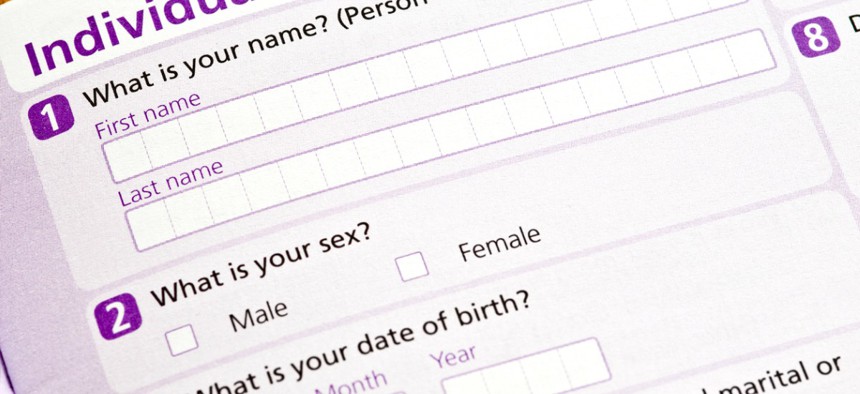VA Officials and Lawmakers Have (Different) Issues With Push to Collect More Veteran Data

onebluelight/istockphoto.com
Republicans worried collection of religious, sexual and gender information would violate veterans’ privacy; agency officials said they already collect that data.
A draft bill proposed by Democrats on the House Veterans Affairs Committee that would mandate the department collect specific data on veterans—including religious affiliation, sexual orientation and gender identity—is being met by resistance from Republican committee members who see it as an invasion of privacy and agency officials who say the bill conflicts with ongoing efforts that meet its intent.
The draft VA Demographic Data Collection Improvement Act was one of three bills being considered during the Veterans Affairs Subcommittee on Technology Modernization’s first legislative hearing.
The bill language directs the agency to mandate collection of certain veteran information, including: legal name; preferred name; race, including Native American or Alaskan native affiliation; ethnicity; religion or identification with a religious group if any, including whether the beneficiary identifies as not associating with a religion or religious group; tribal affiliation; primary language spoken; preferred communication method; sexual orientation; gender identity; preferred pronouns; marital status; parental status; highest degree of education obtained; and income level.
Subcommittee Ranking Member Matt Rosendale, R-Mont., said that while VA already collects much of this information through various programs, “Mandatory collection of the information is unprecedented. At best, it’s a misguided imposition on privacy,” he said. “At worst, it’s left-wing social engineering on a massive scale.”
He took the biggest issue with the requirement to collect information on religious affiliation.
VA officials at the hearing noted the religious information is already ported over from the Defense Department as military personnel transition to veterans. That information has been collected since 2015, they said, in order to coordinate funeral and burial preferences.
Overall, Rosendale said he does not “impugn the author’s motives,” however, he contended the bill “grew out of identity politics that pervade our country. Putting veterans on lists and dividing them into intersectional groups is not progress.”
Rep. Anthony Brown, D-Md., agreed the bill needs work but took issue with Rosendale’s characterization and rhetoric.
“I recognize that there might be disagreement on what type of data should be collected and how it should be organized, labeled or even categorized,” he said, but supported “the underlying intent of this bill.”
However, “I’m a little bit disappointed by the comments of the ranking member,” he said. “There may be disagreements on what we’re doing. But to use characterizations like ‘left-wing socialism,’ ‘identity politics’—those are Republican talking points—I think they really undermine the effort here. We cannot say on the one hand that we are a bipartisan committee working on behalf of our veterans yet resort to partisan talking points.”
VA officials, including acting Principal Deputy Assistant Secretary Paul Brubaker, who serves as deputy chief information officer, told lawmakers the agency already collects most, if not all of this information and would prefer legislation with a focus on improving existing collection, storage, management and analytics efforts.
“While VA certainly agrees that it has opportunities to improve data management and collection capabilities, we have concerns with the draft legislation that is currently written,” he said. “It remains unclear from the draft how collected data would be treated and/or stored and raises concerns related to HIPAA, the Privacy Act and Paperwork Reduction Act that we believe need to be addressed.”
Brubaker also noted the bill does not include any funding for this effort, which would need a new IT system and the staff, planning and ongoing maintenance such a system would require.
Kshemendra Paul, VA’s chief data officer, said that rather than mandate new data collections and a new IT system to store and manage that data, the agency would prefer to focus on transforming the VA Profile program into a central data hub that can be used across departments.
“VA Profile … is our core system for authoritative collection, storage and use of demographic and contact information,” he told lawmakers. “It’s where we bring in data from DOD, for example, as we follow the servicemember into the veteran’s journey.
Paul said there is ample opportunity to improve VA Profile, both in the collection and use of the data, but that that is where the focus should be rather than mandating new collection efforts.
“We look forward to working with the committee to strengthen focus on VA Profile,” Paul said.
He also pointed to a predictive analytics project called U.S. Vets “that has more comprehensive data on all veterans,” which VA officials are also using as part of a larger decision-making data strategy.
“Our view is that we already have much, if not most of the information in the Demographic Data Collection bill,” Paul said, stating that the agency would like to work with committee staff to align the legislation with ongoing efforts rather than requiring new data collection.
Rep. Mark Takano, D-Calif., who chairs the House Veterans Affairs Committee, stressed the bill is still in draft and will very likely be altered but wanted to make sure the “human element” of its intent was not missed.
“We are here to serve all veterans, not some veterans,” Takano said. “If we aren’t collecting the types of information that gives VA a better sense of who they need to serve, then we aren’t doing our jobs.”
Brubaker and Paul agreed with that sentiment and reiterated their support for the intent of the bill but again asked that the committee work with the department on the language of the bill.






